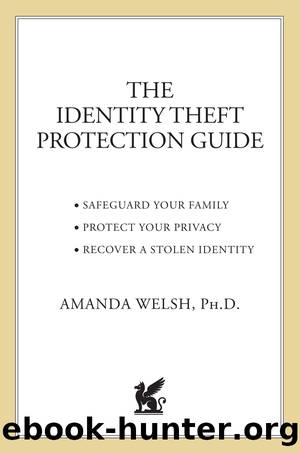The Identity Theft Protection Guide by Amanda Welsh Ph.D

Author:Amanda Welsh, Ph.D.
Language: eng
Format: epub
ISBN: 9781250089915
Publisher: St. Martin's Publishing Group
* * *
LISTING VS. REPORTING VS. PROFILING
Itâs important to begin to distinguish between different kinds of tracking afforded by technology. The distinctions that weâll adopt in this book arenât always clear-cut, but it is important to have some means of separating one form of information collection from another to determine the potential impact a particular instance of tracking can have on you.
Listing occurs when companies or government or other organizations place your name, and perhaps some limited set of identifying characteristics or contact information about you in a central place. The information is generally updated only when there is a change in the information. There is no regular reporting of any transactions. The fact that you are on the list is information about you in itself. Lists can be sold, rented, or exchanged between organizations. You have the power to control whether or not you appear on some but not all lists.
Reporting occurs when companies supply information about your transaction history to a central company that in turn makes that history availableâfor a feeâto other companies considering doing business with you. Reporting often tracks sensitive information, and unauthorized access to it makes you vulnerable to identity theft. You generally donât control whether or not you are subject to reporting.
Profiling occur when information about you is examined and predictions about your behavior are made based upon the actions of other people like you. For an insurance company to rely on the fact that youâve made three claims in two years is an example of their use of reporting. When they consider a score that ranks your likelihood to make a future claim based on the actions of other people who in some way are similar to you, this is an example of profiling. Most of the time you donât control whether or not you are being profiled.
Profiling has become something of a dirty word lately, so itâs worth a little more explanation. The truth is that we all engage in profiling from time to time. Consider what happens when you meet someone for the first time at a party. Based on his or her answers to your questions, you draw upon your experience of similar people to fill in your image of the person youâve just met.
There are times when profiling has the possibility to become sinisterâwhen you are not fully informed that it is being done and how, or when you disagree with the connections a profiler is making between one piece of information and another. Profiling can be especially dangerous when no additional individual information is considered or when it is used for very important or enduring decisions. These times warrant your attention and are worth your voicing an opinion.
Download
This site does not store any files on its server. We only index and link to content provided by other sites. Please contact the content providers to delete copyright contents if any and email us, we'll remove relevant links or contents immediately.
Harry Potter and the Goblet Of Fire by J.K. Rowling(3026)
Unfinished: A Memoir by Priyanka Chopra Jonas(2912)
Never by Ken Follett(2873)
The Man Who Died Twice by Richard Osman(2291)
Machine Learning at Scale with H2O by Gregory Keys | David Whiting(2269)
Fairy Tale by Stephen King(2059)
Will by Will Smith(2033)
Rationality by Steven Pinker(1761)
The Storyteller by Dave Grohl(1656)
The Dawn of Everything: A New History of Humanity by David Graeber & David Wengrow(1566)
The Dark Hours by Michael Connelly(1564)
The Stranger in the Lifeboat by Mitch Albom(1529)
Cloud Cuckoo Land by Anthony Doerr(1428)
The Becoming by Nora Roberts(1324)
Friends, Lovers, and the Big Terrible Thing by Matthew Perry(1324)
Einstein: His Life and Universe by Walter Isaacson(1312)
Crying in H Mart by Michelle Zauner(1312)
New Morning Mercies: A Daily Gospel Devotional by Paul David Tripp(1305)
A Short History of War by Jeremy Black(1295)
